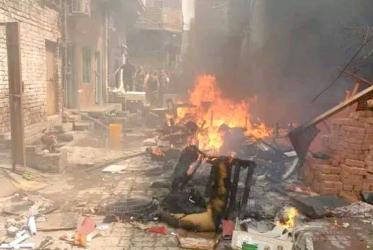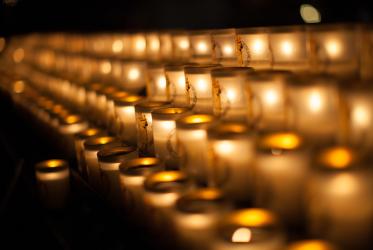20 April 2007
The ethnic conflicts and violence, which have been raging in Sri Lanka, have become a matter of serious concern again in recent weeks. Reports from Sri Lanka continue to reflect the alarming deterioration of the situation in the country. The intensification of killing and violence has turned more and more areas of the country into a battlefield. The escalation of fighting causes the deaths of innocent civilians, military personnel and rebel cadres daily, while the number of abductions, conscription of children, and displacement of people is on the increase. Civilians are caught up in fighting between the Government forces and the Liberation Tigers of Tamil Elam (LTTE). Aerial bombing, mortar shelling and the use of claymore mines have added to the plight of the already suffering people. The northern and eastern parts of the country remain isolated with access in certain areas severely restricted. More than 200,000 civilians have been displaced in recent weeks.
The Cease Fire Agreement, signed between the Government of Sri Lanka and the LTTE on 2 February 2002, was considered promising in the efforts towards ending the ethnic conflict. The international community had extended support to the initiative hoping that it would result in both parties refraining from activities that would undermine the good intentions behind the agreement or impede confidence building measure. However, both the Government and the LTTE violated the Cease Fire Agreement despite the warnings and rulings against them by the Sri Lanka Monitoring Mission set up to monitor the ceasefire's implementation. The escalation of violence since the end of 2005 has pushed this Norwegian-backed peace process onto the back burner despite earlier appeals from the international community. Now, despite the ensuing humanitarian crisis in the northern and eastern parts of the country, Sri Lanka appears to have been forgotten by the international community.
Over the years, the World Council of Churches has monitored the situation in Sri Lanka and called for negotiations between the parties whenever and wherever possible. We are deeply distressed by the current intensification of fighting which affects the lives of thousands of innocent people in the country. Taking into account the protracted fighting in Sri Lanka we in the WCC are convinced that the pursuit of a final military solution is an exercise in futility; the parties to the conflict need to commit themselves to a political solution as the only viable and noble alternative.
We, therefore, appeal to the Government of Sri Lanka and the LTTE to return to the obligations of the Cease Fire Agreement and to therein seek durable solutions to end the fighting that is affecting the lives of so many people. As WCC we strongly appeal to the Government of Sri Lanka and the LTTE to reach a settlement of the ethnic conflicts and put an end to the violence through dialogue and negotiations.
In addition, we urge all parties responsible for the conflict to respect the UN Guiding Principles on Internal Displacements and International Humanitarian Law, making every effort to ensure the security, human rights and dignity of each individual in Sri Lanka.
On behalf of the World Council of Churches I call upon Christians and churches around the world to be constant in prayer for all the people of Sri Lanka who have been undergoing such a traumatising ordeal.
We pray for God's grace and guidance for the efforts of all those who are engaged in their efforts for peace in the country, especially the churches in Sri Lanka working towards peace, reconciliation and reconstruction.
May the grace of God inspire and guide the people of Sri Lanka in their longing for peace with justice, reconciliation and communal harmony in their country.
Rev. Dr Samuel Kobia
General Secretary

